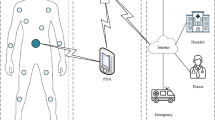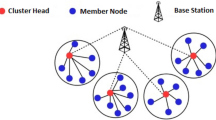Abstract
Energy efficient multicast is a crucial issue in wireless ad hoc and sensor networks. In this paper, we propose an adaptive bi-threshold-based on-demand energy-efficient multicast routing protocol EAP, which is aimed to achieve reduced energy consumption and prolonged network lifetime. For this purpose, EAP introduces two thresholds: One is link power threshold, which is to avoid use of over-long links in a multicast tree so as to reduce the total power for multicasting data packets; the other is energy protection threshold, which is used to discourage energy critical nodes from joining a multicast tree as relay nodes, whenever possible. We elaborate how these two thresholds can facilitate the on-demand energy-efficient multicast tree constructions and also how they can be adaptively updated as network evolves while causing little protocol overhead. We present detailed design description of EAP. Simulation results show that EAP can achieve high performance in terms of network lifetime with little protocol overhead.






Similar content being viewed by others
Notes
In this paper, we treat the death time of the first node in a network as the network’s lifetime.
References
Nadeem A, Hussain MA, Owais O, Salam A, Iqbal S, Ahsan K (2015) Application specific study, analysis and classification of body area wireless sensor network applications. Comput Netw 83:363–380
Modieginyane KM, Letswamotse BB, Malekian R, Abu-Mahfouz AM (2017) Software defined wireless sensor networks application opportunities for efficient network management: a survey. Comput Electr Eng. https://doi.org/10.1016/j.compeleceng.2017.02.026
Floreen P, Kaski P, Kohonen J, Orponen P (2005) Lifetime maximization for multicasting in energy-constrained wireless networks. IEEE J SEL AREA COMM 23(1):117–126
Guo S, Guo M, Leung V (2009) Exploring the multicast lifetime capacity of WANETs with directional multibeam antennas. IEEE INFOCOM 2009:2686–2690
Ruiz PM, Gomez-Skarmeta AF (2005) Approximating optimal multicast trees in wireless multihop networks. IEEE ISCC 2005:686–691
Cagalj M, Hubaux JP, Enz C (2002) Minimum-energy broadcast in all-wireless networks: NP-completeness and distribution issues. ACM MOBICOM 2002:172–182
Georgiadis L (2003) Bottleneck multicast trees in linear time. IEEE Commun Lett 7(11):564–566
Wieselthier JE, Nguyen GD, Ephremides A (2000) On the construction of energy-efficient broadcast and multicast trees in wireless networks. IEEE INFOCOM 2000:585–594
Wieselthier JE, Nguyen GD, Ephremides A (2002) Energy-efficient broadcast and multicast trees in wireless networks. Mobile Netw Appl 7(6):481–492
Liang W (2006) Approximate minimum-energy multicasting in wireless ad hoc networks. IEEE T Mobile Comput 5(4):377–387
Han K, Liu Y, Luo J (2013) Duty-cycle-aware minimum-energy multicasting in wireless sensor networks. IEEE/ACM T Netw 21:91–923
Jiang D, Xu Z, Lv Z (2016) A multicast delivery approach with minimum energy consumption for wireless multi-hop networks. Telecommun Syst 62:771–782
Das SK, Tripathi S, Burnwal AP (2015) Fuzzy based energy efficient multicast routing for ad-hoc network. CCIT 2015:1–5
Shi W, Zhao G, Chen Z (2015) Relay selection and power control for energy-efficient cooperative multicast communication. IEEE VTC 2015:1–6
Royer EM, Perkins CE (1999) Multicast operation of the ad-hoc on-demand distance vector routing protocol. ACM MOBICOM 1999:207–218
Lee S, Su W, Gerla M (2002) On-demand multicast routing protocol in multihop wireless mobile network. Mobile Netw Appl 7:441–453
Tian K, Zhang B, Mouftah HT, Zhao Z (2009) Destination-driven on-demand multicast routing protocol for wireless ad hoc networks. IEEE ICC 2009:1–5
Zhang B, Xue G (2009) Broadcasting, multicasting, and geocasting, In: ‘Wireless sensor networks: a networking perspective,’ chapter 5, Zheng J, Jamalipour A (eds), IEEE-Wiley Press, pp 145–172
Zhang B, Mouftah HT (2003) Forwarding state scalability for multicast provisioning in IP networks. IEEE Commun Mag 41(6):46–51
Huang X, Zhang B (2017) An energy-aware on-demand multicast routing protocol for wireless Ad Hoc and sensor networks. In: EAI Wireless Internet Conference (WICON 2017), pp 1–10
Li P, Guo S, Leung VCM (2013) Maximum-lifetime coding tree for multicast in lossy wireless networks. IEEE Wireless Commun Lett 2(3):295–298
Zhu X, Shen J (2014) Delay constrained maximum lifetime multicast based on particle swarm optimization in wireless ad hoc networks with directional antennas. ICNSC 2014:255–260
Sule C, Shah P, Doddapaneni K, Gemikonakli O, Ever E (2014) On demand multicast routing in wireless sensor networks. AINA 2014:233–238
Maleki M, Pedram M (2004) Lifetime-aware multicast routing in wireless ad hoc networks. IEEE WCNC 2004:1317–1323
Wang B, Gupta SKS (2003) On maximizing lifetime of multicast trees in wireless ad hoc networks. ICPP 2003:333–340
Zhang B, Mouftah HT (2006) Energy-aware on-demand routing protocols for wireless ad hoc networks. Wire Netw 12(4):481–494
Cheng MX, Sun J, Min M, Du DZ (2003) Energy-efficient broadcast and multicast routing in ad hoc wireless networks. IEEE IPCCC 2003:87–94
Acknowledgements
This work was supported partially by the National Natural Science Foundation of China under grants 61471339, 61531006, 61173158.
Author information
Authors and Affiliations
Corresponding author
Rights and permissions
About this article
Cite this article
Huang, X., Zhang, B. An Adaptive Bi-Threshold-Based On-Demand Energy-Efficient Multicast Routing Protocol for Wireless Ad Hoc and Sensor Networks. Mobile Netw Appl 23, 1406–1415 (2018). https://doi.org/10.1007/s11036-018-1077-0
Published:
Issue Date:
DOI: https://doi.org/10.1007/s11036-018-1077-0




